Posted on March 8th, 2010 by Jaimie Schock
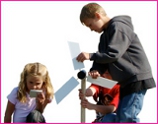 The KidWind Project website offers free resources for teaching about wind power in the K-12 classroom. KidWind offers lesson plans, introductions to key concepts, plans and guides for building model wind turbines, and links to resources around the web. KidWind regularly hosts workshops, events, and conventions, as well.
The KidWind Project website offers free resources for teaching about wind power in the K-12 classroom. KidWind offers lesson plans, introductions to key concepts, plans and guides for building model wind turbines, and links to resources around the web. KidWind regularly hosts workshops, events, and conventions, as well.
Read More
Filed under: Web Resources | Comments Off on Website: KidWind
Tags: Curriculum, Lesson Plans, Science Fair Projects, Web Resources, Wind Energy, Wind Technology, Wind Turbine, Workshops
Posted on March 1st, 2010 by ASEE
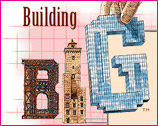
The PBS Bridge page, part of the 5-part television series and website, Build It Big, offers a number of great resources on spans, including: Bridge Basics, Forces Lab, Who Builds Big?, Bridge Webography, and the fun, interactive Bridge Challenge. See also the Educators Guide, with activities, resources, and planning ideas.
Read More
Filed under: Web Resources | Comments Off on Website: Build It Big – Bridges from PBS
Tags: Bridge building, Civil Engineering, Lesson Plans, PBS, Videos
Posted on February 22nd, 2010 by ASEE
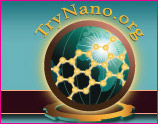 The TryNano.org website for students, parents, teachers, and school counselors, aims to help young people understand basic issues of the discipline and to offer insight into the nanotechnology industry and nanotechnology careers. Users can learn about nanomaterials and applications of nanotechnology; find profiles of companies and universities that apply nanotechnology to products and processes; explore links to university nanotechnology programs, and find lesson plans for the classroom.
The TryNano.org website for students, parents, teachers, and school counselors, aims to help young people understand basic issues of the discipline and to offer insight into the nanotechnology industry and nanotechnology careers. Users can learn about nanomaterials and applications of nanotechnology; find profiles of companies and universities that apply nanotechnology to products and processes; explore links to university nanotechnology programs, and find lesson plans for the classroom.
Read More
Filed under: Web Resources | Comments Off on Website: Nanotechnology Resources
Tags: Lesson Plans, Nanotechnology, Web Resources
Posted on February 22nd, 2010 by ASEE
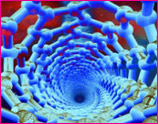
This “Nano Waterproofing” lesson explores how materials can be modified at the nano scale to provide features such as waterproofing and stain resistance. Student teams develop their own waterproofing technique for a cotton fabric and test their design against a fabric that has been altered through nanotechnology applications.
Read More
Filed under: Class Activities, Grades 6-8, Grades 6-8, Grades 9-12, Grades 9-12, Lesson Plans | Comments Off on Lesson: Nano Waterproofing
Tags: Chemical, Class Activities, Design, Grades 6-8, Grades 9-12, Lesson Plans, Nanotechnology
Posted on February 22nd, 2010 by ASEE
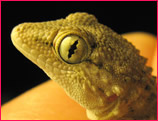 The NanoLeap project represents an approach for teachers to introduce the exciting world of nanoscale science and technology to their classes by integrating interdisciplinary research with traditional science concepts. Investigating Static Forces in Nature: The Mystery of the Gecko is a three-week module that replaces and supplements part of a unit that is normally taught at the beginning of a physical science course.
The NanoLeap project represents an approach for teachers to introduce the exciting world of nanoscale science and technology to their classes by integrating interdisciplinary research with traditional science concepts. Investigating Static Forces in Nature: The Mystery of the Gecko is a three-week module that replaces and supplements part of a unit that is normally taught at the beginning of a physical science course.
Read More
Filed under: Grades 6-8, Grades 9-12, Lesson Plans, Web Resources | 1 Comment »
Tags: Lesson Plans, Nanotechnology, Physics
Posted on February 15th, 2010 by Jaimie Schock
 Energy transfer is a central concept in the majority of engineering designs, including designs for musical instruments. In this lesson, students will grasp the concepts of energy and energy transfer, and then apply what they’ve learned by designing and building their own musical instruments.
Energy transfer is a central concept in the majority of engineering designs, including designs for musical instruments. In this lesson, students will grasp the concepts of energy and energy transfer, and then apply what they’ve learned by designing and building their own musical instruments.
Read More
Filed under: Class Activities, Grades 6-8, Grades 6-8, Lesson Plans | Comments Off on Lesson: Energy Transfer in Musical Instruments
Tags: Class Activities, Curriculum, Energy, Lesson Plans, Music engineering
Posted on February 8th, 2010 by ASEE
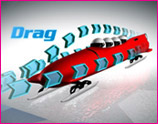
The free site Lessonopoly has created student activities and lesson plans to support the video series, Science of the Olympic Winter Games, created by NBC Learn and the National Science Foundation. Featuring exclusive footage from NBC Sports and contributions from Olympic athletes and NSF scientists, the series aims to help teach students concepts like friction and angular momentum.
Read More
Filed under: Web Resources | Comments Off on Website: Olympics Lesson Plans
Tags: Lesson Plans, National Science Foundation, Olympics, Videos, Web Resources
Posted on February 8th, 2010 by Jaimie Schock
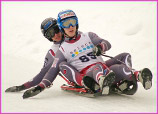 Students build a simulated luge track and make predictions about the impact of surface type, wind resistance, size of slope, and shape of luge on their track; test their predictions by conducting several simulated luge runs; and make conclusions about the effects of physical forces on the sport of luging.
Students build a simulated luge track and make predictions about the impact of surface type, wind resistance, size of slope, and shape of luge on their track; test their predictions by conducting several simulated luge runs; and make conclusions about the effects of physical forces on the sport of luging.
Read More
Filed under: Class Activities, Grades 6-8, Grades 6-8, Grades K-5, Grades K-5, Lesson Plans | 6 Comments »
Tags: Class Activities, Curriculum, Grades 3-8, Lesson Plan, Lesson Plans, Teacher Resources
Posted on February 2nd, 2010 by Jaimie Schock
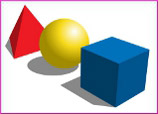 In this lesson plan, students learn how to find shapes in their world. With the help of the children’s book A Triangle for Adaora by Ifeoma Onyefulu, which shares the experience of a young Nigerian girl as she looks for a triangle around her, students learn the basic shapes, then go looking for them in magazines. They then present their findings to the class as shape researchers. This lesson also incorporates cultural learning.
In this lesson plan, students learn how to find shapes in their world. With the help of the children’s book A Triangle for Adaora by Ifeoma Onyefulu, which shares the experience of a young Nigerian girl as she looks for a triangle around her, students learn the basic shapes, then go looking for them in magazines. They then present their findings to the class as shape researchers. This lesson also incorporates cultural learning.
Read More
Filed under: Class Activities, Grades K-5, Grades K-5, Lesson Plans | Comments Off on Lesson: Shapes of Africa
Tags: Class Activities, Curriculum, Lesson Plans, Mathematics, Teacher Resources
 The KidWind Project website offers free resources for teaching about wind power in the K-12 classroom. KidWind offers lesson plans, introductions to key concepts, plans and guides for building model wind turbines, and links to resources around the web. KidWind regularly hosts workshops, events, and conventions, as well.
The KidWind Project website offers free resources for teaching about wind power in the K-12 classroom. KidWind offers lesson plans, introductions to key concepts, plans and guides for building model wind turbines, and links to resources around the web. KidWind regularly hosts workshops, events, and conventions, as well.











 The NanoLeap project represents an approach for teachers to introduce the exciting world of nanoscale science and technology to their classes by integrating interdisciplinary research with traditional science concepts. Investigating Static Forces in Nature: The Mystery of the Gecko is a three-week module that replaces and supplements part of a unit that is normally taught at the beginning of a physical science course.
The NanoLeap project represents an approach for teachers to introduce the exciting world of nanoscale science and technology to their classes by integrating interdisciplinary research with traditional science concepts. Investigating Static Forces in Nature: The Mystery of the Gecko is a three-week module that replaces and supplements part of a unit that is normally taught at the beginning of a physical science course. Energy transfer is a central concept in the majority of engineering designs, including designs for musical instruments. In this lesson, students will grasp the concepts of energy and energy transfer, and then apply what they’ve learned by designing and building their own musical instruments.
Energy transfer is a central concept in the majority of engineering designs, including designs for musical instruments. In this lesson, students will grasp the concepts of energy and energy transfer, and then apply what they’ve learned by designing and building their own musical instruments. 
 Students build a simulated luge track and make predictions about the impact of surface type, wind resistance, size of slope, and shape of luge on their track; test their predictions by conducting several simulated luge runs; and make conclusions about the effects of physical forces on the sport of luging.
Students build a simulated luge track and make predictions about the impact of surface type, wind resistance, size of slope, and shape of luge on their track; test their predictions by conducting several simulated luge runs; and make conclusions about the effects of physical forces on the sport of luging. In this lesson plan, students learn how to find shapes in their world. With the help of the children’s book A Triangle for Adaora by Ifeoma Onyefulu, which shares the experience of a young Nigerian girl as she looks for a triangle around her, students learn the basic shapes, then go looking for them in magazines. They then present their findings to the class as shape researchers. This lesson also incorporates cultural learning.
In this lesson plan, students learn how to find shapes in their world. With the help of the children’s book A Triangle for Adaora by Ifeoma Onyefulu, which shares the experience of a young Nigerian girl as she looks for a triangle around her, students learn the basic shapes, then go looking for them in magazines. They then present their findings to the class as shape researchers. This lesson also incorporates cultural learning.